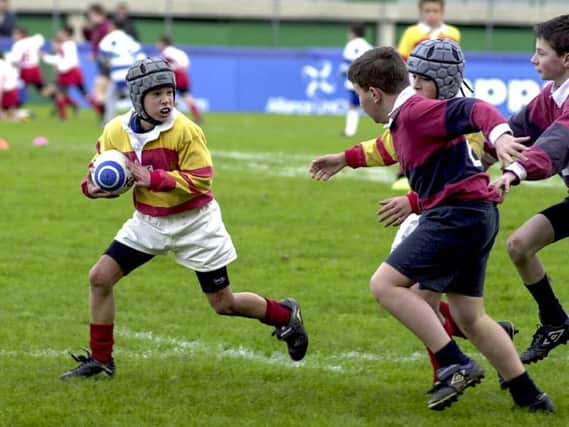Tackling and scrums should be banned from school rugby Government urged


The Government is being urged to "put the interests of the child" before those of the corporate professional unions by removing harmful contact from the game.
Researchers said evidence shows collision sports - such as youth rugby - carry high rates of injury.
Advertisement
Hide AdAdvertisement
Hide AdRugby union and rugby league are the most commonly played collision sports in the physical education curriculum of schools in England.
A recent evidence review found rugby had the most concussion rates in children - over three times more than ice hockey and eight times more than American football.
Other studies show rugby related hospital emergency department attendances in the US are on the rise.
In particular these are for head and face injuries - which make up more than a third of cases.
Advertisement
Hide AdAdvertisement
Hide AdWriting in The BMJ, the researchers say head injury is linked to an increased risk of dementia and Alzheimer's disease.
This adds to existing evidence it may lead to neuro- degenerative conditions such as Parkinson's disease.
Moreover a history of concussion can lower a person's life chances across a range of social and educational measures.
This is an addition to an association to an increasing risk of violent behaviour and violent injury in teenagers.
Advertisement
Hide AdAdvertisement
Hide AdProfessor Allyson Pollock, director of the Institute of Health and Society at Newcastle University, and co-author Graham Kirkwood said rule changes can make a difference.
For example Canada's ban on 'body-checking' - or intentional body contact - in under 13s ice-hockey led to a reduction in concussion risk.
But they point out evidence for other strategies to reduce concussion risk in sport including the wearing of protective equipment such as mouthguards is weak.
And in Britain teacher training in the skills of rugby are lacking as is concussion awareness training.
Advertisement
Hide AdAdvertisement
Hide AdIn July 2016 the four UK chief medical officers (CMOs) rejected the call for a ban on tackling in youth rugby, citing a report which claimed rugby was no more injury prone than other sports.
But Prof Pollock and Mr Kirkwood say - under the United Nations Convention on the Rights of the Child (Article 19) - "governments have a duty to protect children from risks of injury and to ensure the safety of children, which is why we are calling on CMOs to act now."
The experts' concerns have been raised as the RFU (Rugby Football Union) is running a programme of introducing the sport to a million children in state schools across England which is due to finish in 2019.
Prof Pollock has campaigned about the dangers of rugby for years and was among the co-signatories on an open letter to the Government from doctors last year calling for a ban on tackling in school rugby.
Advertisement
Hide AdAdvertisement
Hide AdIt warned children are suffering spinal and head injuries which can have life-long, or even fatal consequences.
Prof Pollock and Mr Kirkwood, a former NHS nurse who is now a senior research associate in the Institute of Health and Society, said most injuries are because of the collision elements of the game - mainly the tackle.
Prof Pollock said: "We call on the chief medical officers to act on the evidence and advise the UK Government to put the interests of the child before those of corporate professional rugby unions and remove harmful contact from the school game."
They said collision sports are where "athletes purposely hit or collide with each other or with inanimate objects - including the ground - with great force."
Advertisement
Hide AdAdvertisement
Hide AdPooled analysis from previous research found rugy had the highest concussion rates in children - 4.18 per 1,000 athlete exposures compared to 1.20 and 0.53 for ice hockey and American football respectively.
A survey carried out by the Australian Sports Medicine Federation across all age groups taking participation into account found rugby league, rugby union and Australian rules football had the highest rates of injury.
A New Zealand study combining injury insurance claims data with exposure data from a range of surveys found that playing rugby - one game every three weeks - was 460 to 530 times more dangerous than a half hour cycle ride trip three times a week.
Another found under-nines playing rugby union with tackling experienced head impacts - measured by ear patches - of a similar magnitude to American high school and college footballers - despite them being younger, lighter and slower.
Advertisement
Hide AdAdvertisement
Hide AdThe toll could be even more worrying for girls who take three or four times longer to recover from concussion.
Prof Polock added: "It's well recognised children are vulnerable and require specific measures to control the unique risks associated with this group.
"The call for a cautionary approach and the removal of collision from school rugby and to end compulsion in the school game is likely to reduce and mitigate the risk of injury in school children."